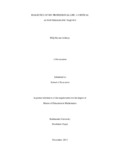
Please use this identifier to cite or link to this item:
https://hdl.handle.net/20.500.14301/224| Title: | DIALECTICS OF MY PROFESSIONAL LIFE: A CRITICAL AUTOETHNOGRAPIC INQUIRY |
| Authors: | Acharya, Dilip Kumar |
| Citation: | Acharya, D.K.(2013).Dialectics of my professional life: A critical autoethnograpic inquiry. |
| Issue Date: | Nov-2013 |
| School: | SOED |
| Department: | DOSE |
| Level: | Masters |
| Program: | Master of Education in Mathematics Education |
| Abstract: | This dissertation portrays my lived experiences in educational journey and makes an exploration into my pedagogical practices as a student, teacher, teacher trainer and novice researcher. In this research, I have presented my experiences acting as a student, acting as a teacher and acting as a novice researcher. While presenting my different experiences, I found my professional life carrying different perspectives, so it relates with my pedagogy practices. While presenting my experiences as a student, I found I was playing the role as an oppressed learner. At that time, I thought mathematics is carrying absolutist term but when I present my experiences as a teacher then my role was found to be an oppressor. At that time I think mathematics is an incomplete and everlasting process (Ernest, 2005). At last, in the researching phase, I came to know about the cause of the oppressing situation. It relates to our pedagogical practices, relationship between students and teachers, active learner, classroom environment, students centered pedagogy. It will help me to develop as a transformative learner (Habermas, 1972) and critically examine my value and practices. In this research study, I used multi paradigms to shape my dissertation under autoethnography method. I have used postmodern approach with multiple ii genres of writing such as poems, narratives. The aim of my research work was to find out why students like me found teachers' behavior oppressing. When I prepared the proposal of my research work, I had only the experience of being a student at different levels. During that time, I thought I was oppressed by the teachers and then when writing this dissertation I get involved in the teaching field and got the experience of teaching. Now the observation and experience helped me to produce the data and critically analyze them. When I started teaching, I found my behavior to be also like that of my teacher, where I also oppressed my students due to their less interest in the study. And I thought it was a cyclic process of education. But when I came to the researching phase, I observed the practice critically, and came to know that it was guided by the pedagogy of the oppressed. I realize that educator and teacher must focus on children’s interest, they should know children's intelligent, they should play different roles at different times. And we have to follow constructivism and collaborative approach. Most of the teachers are habitual to their daily teaching but students are new for the class. So, teachers can teach students at the students' level of understanding. Moreover, the relationship between students and teachers should be close so that students do not feel any kind of discrimination from their tutors. Similarly, teachers can create a student centered learning environment, establish better relationship with students, give practical education, involve students actively in classroom activities and promote meaningful practice. |
| URI: | https://hdl.handle.net/20.500.14301/224 |
| Appears in Collections: | Dissertation |
Files in This Item:
| File | Description | Size | Format | |
|---|---|---|---|---|
| Dilip thesis.pdf | 1.17 MB | Adobe PDF |  View/Open |
Items in DSpace are protected by copyright, with all rights reserved, unless otherwise indicated.